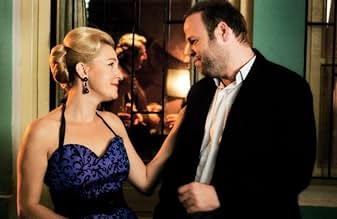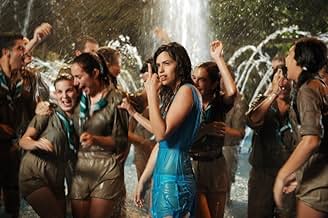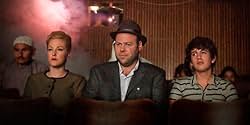Ajouter une intrigue dans votre langueDuring the summer of 1968 a teenage boy goes to work for a matchmaker who has survived the Holocaust - both their lives are forever altered.During the summer of 1968 a teenage boy goes to work for a matchmaker who has survived the Holocaust - both their lives are forever altered.During the summer of 1968 a teenage boy goes to work for a matchmaker who has survived the Holocaust - both their lives are forever altered.
- Réalisation
- Scénario
- Casting principal
- Récompenses
- 4 victoires et 7 nominations au total
Yarden Bar-Kochba
- Nili Burstein
- (as Yarden Bar Kochva)
Yael Levental
- Tikva Abadi
- (as Yael Leventhal)
Kobi Farag
- Moshe Abadi
- (as Kobi Faraj)
Eyal Shehter
- Arik Burstein (Adult)
- (as Eyal Schechter)
Ya'ackov Bodo
- Advocate Segelson
- (as Yaacov Bodo)
Ben Kippris
- Yoram
- (as Ben Kipris)
Avis à la une
10zaaq
1. Not the greatest actors and accents but it boasts carefully written dialogue, captivating characters, and an aesthetically pleasing 70's summer vibe of the region.
2. This movie packs dating angst and teenage nostalgia (for today's boomers), which isn't difficult to relate - mandela effect, anyone? ;P
3. The plot has a nice pace (no stalling/filler imo) and there are moral lessons all along the way. Some lines even came back to me just now; so I decided to recommend it.
Please let me know if you liked me review, it helps :) Thanks
2. This movie packs dating angst and teenage nostalgia (for today's boomers), which isn't difficult to relate - mandela effect, anyone? ;P
3. The plot has a nice pace (no stalling/filler imo) and there are moral lessons all along the way. Some lines even came back to me just now; so I decided to recommend it.
Please let me know if you liked me review, it helps :) Thanks
8Nozz
When they came to Israel, survivors from Nazi Europe did not manage to leave their emotional scars behind.
Even decades later, they found themselves misunderstood by those who had not been "there" in Europe, but in some cases (at least as portrayed in this movie) they thought of love as the great healer and pursued it. They pursued individual love, not free love or universal love, so it is strange that the movie adds a subplot, with an explicit contrast, about the first stirrings of imported Woodstock culture in Israel. Too much, I think. I would rather have seen the story take place ten years earlier and leave out the counterculture. Two cultures, that of the European-born and that of the Israeli-born, would have been contrast enough. I would also rather have seen less effort put into a reconstruction of a square in the Haifa port area that makes it look too vibrant, too colorful, too Fellinesque. (This may be the first Israeli movie that would have benefited from a smaller budget.) But when the movie is on-topic and concentrates on the adult characters rather than on the dream-Haifa set, the period props, or the invasion of American music, it works very well and with the help of some admirable actors, it creates something fresh and good-hearted.
Even decades later, they found themselves misunderstood by those who had not been "there" in Europe, but in some cases (at least as portrayed in this movie) they thought of love as the great healer and pursued it. They pursued individual love, not free love or universal love, so it is strange that the movie adds a subplot, with an explicit contrast, about the first stirrings of imported Woodstock culture in Israel. Too much, I think. I would rather have seen the story take place ten years earlier and leave out the counterculture. Two cultures, that of the European-born and that of the Israeli-born, would have been contrast enough. I would also rather have seen less effort put into a reconstruction of a square in the Haifa port area that makes it look too vibrant, too colorful, too Fellinesque. (This may be the first Israeli movie that would have benefited from a smaller budget.) But when the movie is on-topic and concentrates on the adult characters rather than on the dream-Haifa set, the period props, or the invasion of American music, it works very well and with the help of some admirable actors, it creates something fresh and good-hearted.
The Israeli movie Once I Was (Pa'am Hayiti) was shown in the US with the title The Matchmaker (2010). It was written and directed by Avi Nesher. The film was very popular in Israel, where it won four Israeli Academy Awards. The other reviewers of this film are either Israelis or are familiar with Israeli culture, so they can do a better job than I can discussing the reality of the movie. For example, it is set in the seaport of Haifa in 1968, and there are questions about the authenticity of the sets and the accents. I will leave these topics to the experts.
I'm reviewing the film more on its plot and acting. The plot is fascinating. A Holocaust survivor, Yankele Bride (Adir Miller) is a smuggler and petty criminal. That's his profession, but his hobby is matchmaking. His job is to find mates for people who, for whatever reason, are considered undesirable.
The saddest of these people is a young woman, Sylvia, who is very beautiful but has achondroplasia. (The role is played by the extraordinary actress Bat-El Papura.) Sylva wants to be married, but no person of normal height will consider her as a spouse. Even the hapless character called Meir the Librarian turns away from Sylvia when he meets her. Yankele does his best for her, but he never succeeds.
The most obvious theme of the movie is a coming-of-age story of Arik Burstein (Tuval Shafir), whose father is also a Holocaust survivor. Arik starts work as Yankele's "spy," the person who checks out the matchmaker's clients to make sure that they are who and what they say they are. (There's another theme about a visiting American cousin, who is a liberated young woman, but that subplot never goes anywhere.)
The key theme, as I saw it, is that Holocaust survivors were welcomed to Israel, but they weren't admired or honored. As Arik's father says, "people always want to know what we had to do in order to survive." The clash of cultures--eastern European survivors who were seen as victims vs. Israelis who had fought for independence--is in the background of the entire movie. (Sometimes this clash is overt, sometimes it's subtle, but it's always there.)
Of course, Arik is impressed by the brash, streetwise Yankele, as opposed to his own quiet, respectable father. We are supposed to be impressed by Yankele too, because his criminal activities are treated as amusing foibles. I don't think that smuggling goods into Israel was an appropriate way to thank the country that took you in, but he is definitely a likable character in the movie. Each viewer will have to decide about Yankele for herself or himself.
I liked this film well enough to suggest that it's worth seeing if it comes along. I'm not sure it's a movie I would seek out for viewing. We saw The Matchmaker at the excellent Rochester Jewish Film Festival, screened at the wonderful Dryden Theatre at George Eastman House. It will work equally well on a small screen.
I'm reviewing the film more on its plot and acting. The plot is fascinating. A Holocaust survivor, Yankele Bride (Adir Miller) is a smuggler and petty criminal. That's his profession, but his hobby is matchmaking. His job is to find mates for people who, for whatever reason, are considered undesirable.
The saddest of these people is a young woman, Sylvia, who is very beautiful but has achondroplasia. (The role is played by the extraordinary actress Bat-El Papura.) Sylva wants to be married, but no person of normal height will consider her as a spouse. Even the hapless character called Meir the Librarian turns away from Sylvia when he meets her. Yankele does his best for her, but he never succeeds.
The most obvious theme of the movie is a coming-of-age story of Arik Burstein (Tuval Shafir), whose father is also a Holocaust survivor. Arik starts work as Yankele's "spy," the person who checks out the matchmaker's clients to make sure that they are who and what they say they are. (There's another theme about a visiting American cousin, who is a liberated young woman, but that subplot never goes anywhere.)
The key theme, as I saw it, is that Holocaust survivors were welcomed to Israel, but they weren't admired or honored. As Arik's father says, "people always want to know what we had to do in order to survive." The clash of cultures--eastern European survivors who were seen as victims vs. Israelis who had fought for independence--is in the background of the entire movie. (Sometimes this clash is overt, sometimes it's subtle, but it's always there.)
Of course, Arik is impressed by the brash, streetwise Yankele, as opposed to his own quiet, respectable father. We are supposed to be impressed by Yankele too, because his criminal activities are treated as amusing foibles. I don't think that smuggling goods into Israel was an appropriate way to thank the country that took you in, but he is definitely a likable character in the movie. Each viewer will have to decide about Yankele for herself or himself.
I liked this film well enough to suggest that it's worth seeing if it comes along. I'm not sure it's a movie I would seek out for viewing. We saw The Matchmaker at the excellent Rochester Jewish Film Festival, screened at the wonderful Dryden Theatre at George Eastman House. It will work equally well on a small screen.
THIS is how movies should be made -- but all to often are not...! When it comes to the movies that have been coming out in the past 30-plus years, but most especially the past 15 years, I pretty much have lost my appetite for film-watching as a hobby. Fortunately, there are some exceptions to the rule, the THE MATCHMAKER, set in Israel, is one of them! Forget the Hollywood formula flicks, special effects, "cool" creeps and so much in recent films that have all but ruined movies for me. Once in a while, when I have just about lost all hope, I can still find a jewel like this film.
I'm not going to tell you anything about it, except that it is "all that," without the vulgarities that run rampant in films today or the philosophical slants that try to convince the viewer that black is white and white is black. Nope. It's just excellent -- the story line, the cinematography, the acting, the settings. Just plain excellent. BRAVO!
I'm not going to tell you anything about it, except that it is "all that," without the vulgarities that run rampant in films today or the philosophical slants that try to convince the viewer that black is white and white is black. Nope. It's just excellent -- the story line, the cinematography, the acting, the settings. Just plain excellent. BRAVO!
Sensitive, funny and smart. This movie stay with you days after watching. The directing is accurate and Adir Miller is great as the main actor (The match maker). The story really reflects the life in Israel in the late 60s' and early 70s'. The sad story of the holocaust survivors, combined with the stories of those Jews who were born in Israel, and those who immigrated from other countries rather then from Europe, or those who immigrated before WWII is shown in a very delicate way through the story of a young teenager and the matchmaker. The movie also raises some interesting moral issues and as said, It leaves you to think about it days afterwards. Great movie!!!
Le saviez-vous
- AnecdotesAuthors mentioned by Meir and Arik in the library include Dashiell Hammett, Ernest Hemingway, Shmuel Yosef Agnon (1888 -1970; Nobel Prize laureate writer and a major figure of modern Hebrew writing) and Yehiel Dinur (1909 - 2001; also spelled Dinoor or De-Nur; also known by his pen name Ka-Tsetnik, a Jewish writer and Holocaust survivor).
- GaffesArik has a promotional picture of John Wayne from the film, "The Cowboys:", on his wall. This film was not released until i972, 4 years after this film's setting.
- Crédits fousComposer Philippe Sarde wishes to dedicate his score in memory of his grandmother Marie.
- ConnexionsReferences Le Kid (1921)
- Bandes originalesBalkan Folk Songs
Accordion by Anatolie Gieko
Violin by Pavel Levine
Meilleurs choix
Connectez-vous pour évaluer et suivre la liste de favoris afin de recevoir des recommandations personnalisées
Détails
Box-office
- Budget
- 2 150 000 $US (estimé)
- Montant brut mondial
- 2 920 $US
- Durée1 heure 52 minutes
- Couleur
- Mixage
Contribuer à cette page
Suggérer une modification ou ajouter du contenu manquant

Lacune principale
By what name was Once I Was (2010) officially released in Canada in English?
Répondre































